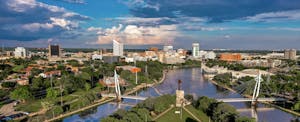 Image: Couple smiling at each other as they sit together at a rooftop restaurant while on vacation
Image: Couple smiling at each other as they sit together at a rooftop restaurant while on vacationInsights
At Credit Karma, our editors are here to help you navigate the latest in consumer finance, including economic trends. Staying informed about money doesn’t have to be difficult.
 Image: Couple smiling at each other as they sit together at a rooftop restaurant while on vacation
Image: Couple smiling at each other as they sit together at a rooftop restaurant while on vacation Image: The Tulsa, Oklahoma, downtown skyline against an orange hued sky at twilight
Image: The Tulsa, Oklahoma, downtown skyline against an orange hued sky at twilight Image: Aerial view of the downtown Wichita, Kansas skyline against a blue sky, with the Arkansas River in the foreground
Image: Aerial view of the downtown Wichita, Kansas skyline against a blue sky, with the Arkansas River in the foreground Image: The downtown Winston-Salem, North Carolina, skyline under a cloudy blue sky.
Image: The downtown Winston-Salem, North Carolina, skyline under a cloudy blue sky. Image: Aerial view of the downtown Memphis Tennessee skyline with the Wolf River harbor and the Hernando de Soto Bridge in the foreground.
Image: Aerial view of the downtown Memphis Tennessee skyline with the Wolf River harbor and the Hernando de Soto Bridge in the foreground. Image: Skyline view of downtown Toledo, riverwalk and river in foreground
Image: Skyline view of downtown Toledo, riverwalk and river in foreground Image: Couple talking to each other while sitting by cardboard boxes near van
Image: Couple talking to each other while sitting by cardboard boxes near van Image: Sunset view of the St. Louis Arch and city skyline
Image: Sunset view of the St. Louis Arch and city skyline Image: Aerial view of Menlo Park, a city in one of the richest counties in the US
Image: Aerial view of Menlo Park, a city in one of the richest counties in the US Image: A small town main street in West Virginia with a hillside and the setting sun in the background.
Image: A small town main street in West Virginia with a hillside and the setting sun in the background. Image: best-places-to-retire
Image: best-places-to-retire Image: A seated woman looks thoughtfully at her laptop while taking notes.
Image: A seated woman looks thoughtfully at her laptop while taking notes. Image: The downtown Cleveland skyline at dusk with the Cuyahoga River in the foreground.
Image: The downtown Cleveland skyline at dusk with the Cuyahoga River in the foreground. Image: Row of houses in a city
Image: Row of houses in a city Image: A city street crowded with holiday shoppers.
Image: A city street crowded with holiday shoppers. Image: Aerial view of a housing development
Image: Aerial view of a housing development Image: Milwaukee downtown skyline underneath a bright blue sky, with Lake Michigan in the foreground
Image: Milwaukee downtown skyline underneath a bright blue sky, with Lake Michigan in the foreground Image: Colorful sunset sky behind downtown Phoenix skyline, with palm trees in the foreground
Image: Colorful sunset sky behind downtown Phoenix skyline, with palm trees in the foreground Image: san-francisco-debt-statistics
Image: san-francisco-debt-statistics Image: The skyline of San Jose, California under stormy clouds with rolling hills in the background.
Image: The skyline of San Jose, California under stormy clouds with rolling hills in the background. Image: City skyline of downtown Seattle during the day, blue sky and clouds in the background, with the space needle front and center
Image: City skyline of downtown Seattle during the day, blue sky and clouds in the background, with the space needle front and center Image: View of fields and a rural farm with a silo on a winter day with snow visible in the ruts of the field.
Image: View of fields and a rural farm with a silo on a winter day with snow visible in the ruts of the field. Image: Detroit's skyline at dusk catching the last of the sun with deep blue clouds overhead.
Image: Detroit's skyline at dusk catching the last of the sun with deep blue clouds overhead. Image: Sunset view of Fremont, California, from high up on a green hill
Image: Sunset view of Fremont, California, from high up on a green hill Image: Two women outside on a city street, doing their holiday shopping together
Image: Two women outside on a city street, doing their holiday shopping together Image: Cleveland, Ohio, city skyline during the day
Image: Cleveland, Ohio, city skyline during the day Image: View of downtown Buffalo from the waterfront
Image: View of downtown Buffalo from the waterfront Image: Late afternoon skyline of downtown Houston, Texas, with skyscrapers in the background with a blue sky behind, and a tree-lined river in the foreground
Image: Late afternoon skyline of downtown Houston, Texas, with skyscrapers in the background with a blue sky behind, and a tree-lined river in the foreground Image: Aerial view of the downtown Irvine, California skyline with palm trees in the foreground and a blue sky overhead..
Image: Aerial view of the downtown Irvine, California skyline with palm trees in the foreground and a blue sky overhead.. Image: Daytime skyline of downtown Los Angeles, with tall high rise buildings in the background and palm trees in the foreground.
Image: Daytime skyline of downtown Los Angeles, with tall high rise buildings in the background and palm trees in the foreground. Image: A close up of a pair of hands on a car steering wheel with a highway and other cars visible through the windshield.
Image: A close up of a pair of hands on a car steering wheel with a highway and other cars visible through the windshield. Image: View from the water of Chicago's skyline
Image: View from the water of Chicago's skyline Image: A mother buckles a small child into a carseat in the backseat of a car while another child looks on.
Image: A mother buckles a small child into a carseat in the backseat of a car while another child looks on. Image: A woman checks standing next to her car uses a smartphone to check her car insurance rate.
Image: A woman checks standing next to her car uses a smartphone to check her car insurance rate. Image: A couple seated at a table use a laptop while reviewing their paper bills.
Image: A couple seated at a table use a laptop while reviewing their paper bills. Image: Woman sitting at home with her baby, paying her rent on her computer
Image: Woman sitting at home with her baby, paying her rent on her computer
